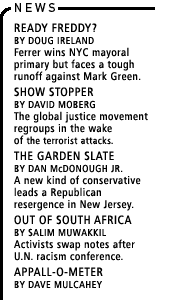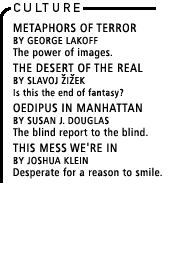|
|

|

|

|
|
|
| |
|
|
|
As a metaphor analyst, I want to begin with the power of images. The images we
There are a number of metaphors for buildings. A common visual metaphor is Buildings Are Heads, where windows and doors are openings in the head like eyes, nose and mouth. For many people this metaphor interacted with the image of the plane going into the South Tower of the World Trade Center, producing via visual metaphor the unconscious but powerful image of a bullet going through someone's head, the flame pouring from the other side, blood spurting out. Tall buildings can, via visual metaphor, be people standing erect. For many the falling of the towers activated this metaphor. Each tower falling was a body falling. We are not consciously aware of the metaphorical images, but they are part of the power and the horror we experience when we see them. Each of us, in the prefrontal cortex of our brains, has what are called "mirror neurons." Such neurons fire either when we perform an action or when we see the same action performed by someone else. There are connections from that part of the brain to the emotional centers. Such neural circuits are believed to be the basis of empathy. This works literally—when we see the plane coming toward the building and imagine people in the building, we feel the plane coming toward us; when we see the building toppling toward others, we feel the building toppling toward us. It also works metaphorically: If we see the plane going through the building, and we unconsciously metaphorize the building as a head with the plane going through its temple, then we sense—unconsciously but powerfully—being shot through the temple. If we metaphorize the building as a person and see the building fall to the ground in pieces, then we sense—again unconsciously but powerfully—that we are falling to the ground in pieces. Our systems of metaphorical thought, interacting with our mirror neuron systems, turn external literal horrors into felt metaphorical horrors. Here are some other cases:
Our minds play tricks on us. The image of the Manhattan skyline is now unbalanced. We are used to seeing it with the towers there. Our mind imposes our old image of the towers, and the sight of them gone gives one the illusion of imbalance, as if Manhattan were sinking. Given the symbolism of Manhattan as standing for the promise of America, it appears metaphorically as if that promise were sinking. Then there is the persistent image, day after day, of the charred and smoking remains: It is an image of hell. The World Trade Center was a potent symbol, tied into our understanding of our country and ourselves in a myriad of ways. All of what we know is physically embodied in our brains. To incorporate the new knowledge requires a physical change in the synapses of our brains, a physical reshaping of our neural system. The physical violence was not only in New York and Washington. Physical changes—violent ones—have been made to the brains of all Americans. The Bush administration's framings and reframings and its search for metaphors should be noted. The initial framing was as a "crime" with "victims" and "perpetrators" to be "brought to justice" and "punished." The crime frame entails law, courts, lawyers, trials, sentencing, appeals and so on. It was hours before "crime" changed to "war" with "casualties," "enemies," "military action," "war powers" and so on. This situation does not fit our understanding of a "war." There are "enemies" and "casualties" all right, but no enemy army, no regiments, no tanks, no ships, no air force, no battlefields, no strategic targets and no clear "victory." The war frame just doesn't fit. Colin Powell had always argued that no troops should be committed without specific objectives, a clear and achievable definition of victory, a clear exit strategy—and no open-ended commitments. But he has pointed out that none of these is present in this "war." Because the concept of "war" doesn't fit, there is a frantic search for metaphors. First, Bush called the terrorists "cowards"—but this didn't seem to work too well for martyrs who willingly sacrificed their lives for their moral and religious ideals. More recently he has spoken of "smoking them out of their holes" as if they were rodents, and Defense Secretary Donald Rumsfeld has spoken of "drying up the swamp they live in" as if they were snakes or lowly swamp creatures. The conceptual metaphors here are Moral Is Up; Immoral Is Down (they are lowly) and Immoral People Are Animals (that live close to the ground). The use of the word "evil" in the administration's discourse works in the following way. In conservative, "Strict Father" morality, evil is a palpable thing, a force in the world. To stand up to evil you have to be morally strong. If you're weak, you let evil triumph, so that weakness is a form of evil in itself, as is promoting weakness. Evil is inherent, an essential trait, that determines how you will act in the world. Evil people do evil things. No further explanation is necessary. There can be no social causes of evil, no religious rationale for evil, no reasons or arguments for evil. The enemy of evil is good. If our enemy is evil, we are inherently good. Good is our essential nature and what we do in the battle against evil is good. Good and evil are locked in a battle, which is conceptualized metaphorically as a physical fight in which the stronger wins. Only superior strength can defeat evil, and only a show of strength can keep evil at bay. Not to show overwhelming strength is immoral, since it will induce evildoers to perform more evil deeds because they'll think they can get away with it. To oppose a show of superior strength is therefore immoral. Nothing is more important than the battle of good against evil, and if some innocent noncombatants get in the way and get hurt, it is a shame, but it is to be expected and nothing can be done about it. Indeed, performing lesser evils in the name of good is justified—"lesser" evils like curtailing individual liberties, sanctioning political assassinations, overthrowing governments, torture, hiring criminals and "collateral damage." Then there is the basic security metaphor, Security As Containment—keeping the evildoers out. Secure our borders, keep them and their weapons out of our airports, have marshals on the planes. Most security experts say that there is no sure way to keep terrorists out or to deny them the use of some weapon or other; a determined, well-financed terrorist organization can penetrate any security system. Or they can choose other targets, say, oil tankers. Yet the Security As Containment metaphor is powerful. It is what lies behind the missile shield proposal. Rationality might say that the September 11 attack showed the missile shield is pointless. But it strengthened the use of the Security As Containment metaphor. As soon as you say "national security," the Security As Containment metaphor will be activated and with it, the missile shield. The reaction of the Bush administration is just what you would expect a conservative reaction to be—pure Strict Father morality: The world is a dangerous place. There is evil loose in the world. We must show our strength and wipe it out. Retribution and vengeance are called for. If there are "casualties" or "collateral damage," so be it. The reaction from liberals and progressives has been far different: Justice is called for, not vengeance. Understanding and restraint are what is needed. The model for our actions should be the rescue workers and doctors—the healers—not the bombers. We should not be like them, we should not take innocent lives in bringing the perpetrators to justice. Massive bombing of Afghanistan—with the killing of innocents—will show that we are no better than they. But it has been the administration's conservative message that has dominated the media. The event has been framed in their terms. As Newt Gingrich put it on the Fox Network, "Retribution is justice." We must reframe the discussion. I was reminded recently of Gandhi's words: Be the change you want. The words apply to governments as well as to individuals. There are (at least) three kinds of causes of radical Islamic terrorism: 1) worldview, or religious rationale; 2) social and political conditions, or cultures of despair; 3) means, or the enabling conditions. The Bush administration has discussed only the third: the means that enable attacks to be carried out. These include leadership (e.g., bin Laden), host countries, training facilities and bases, financial backing, cell organization, information networks and so on. These do not include the first and second causes on the list. The question that keeps being asked in the media is, "Why do they hate us so much?" It is important at the outset to separate moderate to liberal Islam from radical Islamic fundamentalists, who do not represent most Muslims. Radical Islamic fundamentalists hate our culture. They have a worldview that is incompatible with the way that Americans—and other Westerners—live their lives. One part of this worldview concerns women, who are seen as "pearls," objects of value and beauty to be hidden from all men but their husbands. They are to hide their bodies, they have no right to property, no right to travel on their own. Western sexuality, mores, music and women's equality all violate their values, and the worldwide ubiquity of American cultural products, like movies and music, offends them. A second part concerns theocracy. Radical Islamists believe that governments should be run according to strict Islamic law by clerics. A third concerns holy sites, like those in Jerusalem, which they believe should be under Islamic political and military control. A fourth concerns the commercial and military incursions by Westerners on Islamic soil, which they liken to the invasion of the hated crusaders. The way they see it, our culture spits in the face of theirs. A fifth concerns jihad—holy war to protect and defend the faith. A sixth is the idea of a martyr, a man willing to sacrifice himself for the cause. His reward is eternal glory—an eternity in heaven surrounded by willing young virgins. In some cases, there is a promise that his family will be taken care of by the community. Most Islamic would-be martyrs not only share these beliefs but have grown up in a culture of despair that leaves people vulnerable to the idea of martyrdom: They have little to lose. Eliminate the conditions of despair and you eliminate much of the breeding ground for terrorists. When the Bush administration speaks of eliminating terror, it does not appear to be talking about remedying cultures of despair and the social conditions that lead one to want to give up one's life to martyrdom. Country by country, the conditions (both material and political) leading to despair need to be addressed, with a worldwide commitment to ending them. It should be done because it is a necessary part of addressing the causes of terrorism—and because it is right. The anti-terrorist coalition being formed should be made into a long-term global institution for this purpose. That would address the second cause. But what about the first—the radical Islamic worldview itself? Military action won't change it. Social action won't change it. Worldviews live in the minds of people. How can one change those minds—and if not present minds, then future minds? The West cannot! Those minds can only be changed by moderate and liberal Muslims—clerics, teachers, elders, respected community members. There is no shortage of them. It is vital that they form a unified voice against hate and, with it, terror. Remember that "taliban" means "students." Those who teach hate in Islamic schools must be replaced—and we in the West cannot replace them. This can only be done by an organized, moderate, nonviolent Islam. The West may be able to help in some ways, but alone we are powerless to carry it out. We depend on the goodwill—as well as the courage and effectiveness—of moderate Islamic leaders. To gain it, we must show our goodwill by beginning in a serious way to address the social and political conditions that lead to despair. But a conservative American government, thinking of the enemy as evil, will not take the primary causes seriously. They will only go after the enabling causes. But unless the primary causes are addressed, terrorists will continue to be spawned. Rep. Barbara Lee (D-California), who I am proud to acknowledge as my representative in Congress, said the following in casting the lone vote against giving President Bush full congressional approval for carrying out his War on Terrorism as he sees fit: I am convinced that military action will not prevent further acts of international terrorism against the United States. This is a very complex and complicated matter. ... However difficult this vote may be, some of us must urge the use of restraint. Our country is in a state of mourning. Some of us must say, let us step back for a moment. Let us just pause for a minute and think through the implications of our actions today so that this does not spiral out of control. I have agonized over this vote, but I came to grips with it today and I came to grips with opposing this resolution during the very painful yet very beautiful memorial service. As a member of the clergy so eloquently said, "As we act, let us not become the evil that we deplore." I agree. But what is striking to me as a linguist is the use of negatives in the statement: "not prevent," "restraint" (inherently negative), "not spiral out of control," "not become the evil that we deplore.'' Friends are circulating a petition calling for "justice without vengeance." "Without" has another implicit negative. It is not that these negative statements are wrong. But what is needed is a positive form of discourse. There is one. The central concept is that of "responsibility," which is at the heart of progressive or liberal morality. Such morality begins with empathy, the ability to understand others and feel what they feel. That is presupposed in responsibility—for oneself, for protection, for the care of those who need care, and for the community. Those were the values that we saw at work among the rescue workers in New York right after the attack. Responsibility requires competence and effectiveness. If you are to deal responsibly with terrorism, you must deal effectively with all its causes: religious, social and enabling causes. Responsibility requires care in the place of blundering, overwhelming force. Bombing innocent civilians and harming them by destroying their country's domestic infrastructure will be counterproductive—as well as immoral. Failure to address the religious and social causes would also be irresponsible. The responsible response begins with joint international action to address all three: the social and political conditions, the religious worldview and the means with all due care. I have been working on a monograph on foreign policy. The idea behind it is this: There are many advocacy groups that have long been doing important good works in the international arena, but on issues that have not officially been seen as being a proper part of foreign policy: the environment, human rights, women's rights, the condition of children, labor, international public health issues (e.g., AIDS in Africa), sustainable development, refugees, international education and so on. The metaphors that foreign policy experts have used to define foreign policy rule out these important concerns. Those metaphors involve self-interest (e.g., the Rational Actor Model), stability (a physics metaphor), industrialization (unindustrialized nations are "underdeveloped") and trade (freedom is free trade). An alternative way of thinking about foreign policy would consider all these issues a natural part of what foreign policy is about. The premise is that, when international relations work smoothly, it is because certain moral norms of the international community are being followed. These moral norms come out of what I call "nurturant morality." It is a view of ethical behavior that centers on empathy and responsibility (for both yourself and others needing your help). Many things follow from these central principles: fairness, minimal violence (e.g., justice without vengeance), an ethic of care, protection of those needing it, a recognition of interdependence, cooperation for the common good, the building of community, mutual respect and so on. When applied to foreign policy, nurturant moral norms would lead the American government to uphold the ABM treaty, sign the Kyoto accords, engage in a form of globalization governed by an ethics of care—and it would automatically make all the concerns listed above part of our foreign policy. This, of course, implies multilateralism, interdependence and international cooperation. But these three principles, without nurturant norms, can equally well apply to the Bush administration's continuation of its foreign policy. Bush's foreign policy, as he announced in his election campaign, has been one of self-interest ("what's in the best interest of the United States")—if not outright hegemony. The Democratic leaders incorrectly criticized Bush for being isolationist and unilateralist on issues like the Kyoto accords and the ABM Treaty. He was just following his stated policy of self-interest. Indeed, the mistake of Bush's critics has been to use "multilateralism" versus "unilateralism" as a way to categorize foreign policy. Self-interest crosses those categories. When it is in America's interest (as he sees it), he will work with other nations. His War on Terrorism will therefore change his image to that of an internationalist. There is, interestingly, an apparent overlap between the nurturant norms policy and an idealistic vision of the Bush administration's new war. The overlap is, simply, that it is a moral norm to refuse to engage in, or support, terrorism. From this perspective, it looks like the left and the right are united. It is an illusion. In nurturant norms policy, anti-terrorism arises from another moral norm: Violence against innocent parties is immoral. But Bush's new war will certainly not follow that moral norm. Bush's military advisers appear to be planning massive bombings and infrastructure destruction that will certainly take the lives of a great many innocent civilians. The idealistic claim of the Bush administration is they intend to wipe out "all terrorism." What is not mentioned is that the United States has systematically promoted a terrorism of its own and has trained terrorists, from the contras to the mujahedin to the Honduran death squads to the Indonesian military. Indeed, there are reports that two of the terrorists taking part in the attacks were trained by the United States. Will the U.S. government stop training terrorists? Of course not. It will deny that it does so. Is this duplicity? Not in terms of conservative morality and its view of good versus evil and lesser evils. If the administration's discourse offends us, we have a moral obligation to change public discourse. Be the change you want. If the United States wants terror to end, the United States must end its own contribution to terror. And we must also end terror sponsored not against the West but against others. We have made a deal with Pakistan to help in Afghanistan. Is it part of the deal that Pakistan renounce its own support of terrorism in Kashmir against India? I would be shocked if it were. The Bush foreign policy of self-interest does not require it. The question must be asked. If that is not part of the deal, then
our government has violated its own stated ideals; it is hypocritical.
If the terrorism we don't mind—or might even like—is perpetuated,
terrorism will not end and will eventually turn back on us, just
as our support for the mujahedin did. The foreign policy of moral
norms is the only sane foreign policy. We must be the change we
want!
|





